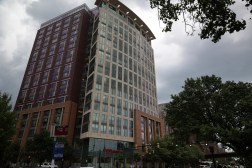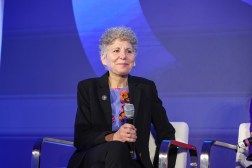NSF wants you to build an app to help reskill federal workers
The National Science Foundation announced five winners Friday for the first phase of its Career Compass challenge — a competition to crowdsource ideas for technology solutions that will help federal workers plan for the changing nature of work.
The winners, which described of tech-enabled solutions to help reskill and upskill the federal workforce, came from a pool of 60 white papers. The challenge envisions technology that uses artificial intelligence and “knows your skills, strengths and preferences; recommends possible future careers; and suggests growth paths.”
The winning ideas, which each received a $5,000 prize, are:
- Needed: A GPS for Learning and Work
- E-TAG: Employee Training and Growth through Electronic Games
- My Career Compass
- ACCESS: An Integrated Service Platform for Preparing Future Workforce
- The Career CHARTING App
These ideas came from teams of academics, private companies and nonprofits. They are not final products by any means but essentially blueprints that others can build upon in phase two of the challenge.
NSF CIO Dorothy Aronson explained that Career Compass started “with our interest in trying to figure out how we could use artificial intelligence to improve our business processes here at NSF,” which then led to “concern about the workforce.”
“If we went ahead and modernized our business processes, what would the impact be on the workforce?” she told FedScoop. “And we amplified that to ask if this kind of problem exists here it probably exists elsewhere, and we were just wondering, as the nature of work changes and becomes more automated, what are people going to do?”
It’s not an uncommon concern to have in the federal government — and it’s one the White House has paid particular interest to in recent years and placed at the heart of the President’s Management Agenda. It aligns with the administration’s cross-agency priority goal of “developing a workforce for the 21st century.” This challenge’s cross-sector collaboration also serves as a model for the work the administration’s GEAR Center will do one finalized, Aronson said.
Now, in the second phase of the challenge, NSF is calling for teams to submit working prototypes based on the five ideas from phase one. Teams do not need to have participated in the first phase to submit prototypes in phase two. One winner will be selected for a prize of $75,000.
Aronson admitted that it’s an ambitious challenge. Ultimately, though, she said, the point is to “stimulate a conversation, let people know that this was the kind of tool we believed would be essential to enabling people to create their own destinies.”
“A large part of this is the concept that individuals should be able to choose their own future paths and that in the future, the type of work people will do will change frequently throughout their lives,” she said. “So through this tool, we’re hoping to bring to the marketplace’s attention that there’s a genuine desire on the part of the federal government starting with NSF and maybe beyond the federal government to use tools like this to enable the future of work.”
At the end of the challenge, NSF explains on the competition page, it hopes “to have created a ‘market’ for technology solutions that will help employees plot a path for changing careers or identify how to move forward in their current career path, while also facilitating continuous reskilling.”






